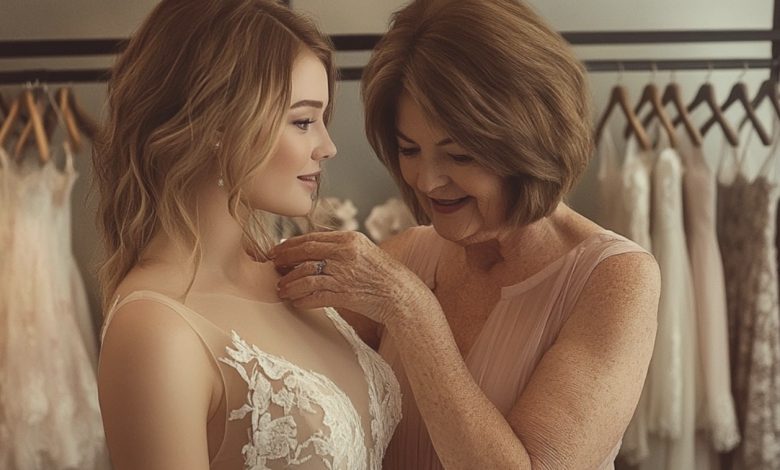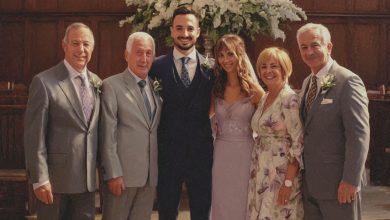Mom Said I Shouldn’t Wear My Gown Because It’d Upstage My Sister — At My Own Ceremon

When I was a child, I always felt as though I were living in the shadow of my younger sister, Jane. From birthday parties to school recitals, my mother, Martha, showered Jane with a level of attention I could only dream of. My achievements—good grades, piano recitals, making the honor roll—were met with polite nods. Jane’s milestones were occasions for proclamation and celebration. As I grew older, I learned to accept this as normal: I was always “the other one,” the daughter who existed to make room for Jane’s accomplishments.
For years, I never let it bother me too much. My sister and I were close, and I genuinely loved seeing her shine. But when I became engaged to Richard, the man I’d fallen in love with halfway through college, I finally began to believe it might be my turn in the spotlight. I pictured our wedding day over and over in my mind: a warm June afternoon, the soft rustle of my dress as I walked down the aisle, Richard’s face lighting up when he first saw me, and the joyful celebration afterward. For the first time in my life, I allowed myself to believe that I, too, could feel like the center of someone’s world.
The moment had arrived to choose my wedding gown. I invited my mother and Jane to the bridal boutique for what I expected to be a day of laughter, tears, and “yes!” moments. I tried on dress after dress: satin mermaid gowns, sleek column silhouettes, ball gowns fit for princesses. None felt quite right. Then, I slipped into an ivory off-the-shoulder A-line dress covered in lace appliqué. The bodice fit like a glove, and the skirt billowed behind me in a train that seemed to float on air. When I caught my reflection, I saw not only a bride but a woman at last fully herself. I felt tears well in my eyes.
The consultant beamed. “Darling, that’s the one,” she said. Jane rushed forward, clapping her hands. “You look like a fairy princess!” she cried. “Richard will faint!”
My heart soared—until I glanced at Mom. She’d sat in the cushioned waiting chair, arms crossed, her expression unreadable. When I turned back, she offered me a tight smile. “It’s a bit much,” she said quietly. “Maybe something simpler would suit you better.”
My smile slipped. “Simpler?” I echoed, bewildered. “Mom, I’m the bride. Of course I want something special.”
She waved a hand. “Sweetheart, I just worry you’ll outshine Jane. You two can’t wear that much white at once. It’ll look silly. Maybe we find another dress—something cream or champagne, not ivory.”
I stared, stunned. “Outshine my sister—at my wedding?” I asked, half-laughing, half-horrified.
Mom looked at me earnestly. “You know Jane’s not engaged yet. People will talk. You don’t want to make her feel bad on my account.”
My eyes filled with tears—tears of anger and a sharp sadness that cut deeper than I’d felt in years. Jane, sensing the shift, hurried over. “Mom, stop,” she said softly. “This is Lizzie’s day.”
I left the salon that afternoon in a fog. When I got home, I sat on our couch and called Richard. He listened quietly as I told him what had happened, my voice shaking. When I finished, he said simply, “Wear the dress you love. It’s our wedding. Your mother’s fears are not our problem.”
His words settled around me like a blessing. I realized then that, at last, I had someone who would have my back no matter what. I called the consultant the next day to reserve the lace gown. I would not let my mother’s jealousy rob me of my dream dress.
In the weeks that followed, I tried to compartmentalize the hurt. I directed my energy into planning the ceremony, designing invitations, finalizing the menu. But every phone call or visit from Mom carried an undercurrent of tension, a reminder that she still thought me selfish. Each time I mentioned the lace dress, she hemmed and hawed. “Let’s keep options open,” she’d say. “Just in case.”
Finally, the wedding day arrived. My heart raced as I stepped into the bridal suite at the venue. A team of attendants bustled around, pinning veils, adjusting trains, perfecting makeup. I closed my eyes and took a deep breath, remembering who I was and why I was here—not to please my mother, but to marry the man I loved.
Mom entered, paused, then gasped softly when she saw me. I stood before the full-length mirror in the lace gown—white as fresh snow, sparkling faintly in the soft light. My chest tightened as I braced for her reaction.
Instead of a smile, she offered a pinched expression. “That’s… very bold,” she said, her voice carefully neutral. “It’s almost too white.”
I looked at her through the mirror. “Too white?” I asked. “It’s exactly what I want.”
Mom turned away, muttering, “I just worry how this will look next to Jane.” She left abruptly, leaving me to smooth my skirt alone.
The ceremony itself was everything I’d hoped for. Richard’s eyes shone as he recited his vows. Our friends laughed at our jokes. Our family clapped and cheered as we sealed our promises with a kiss. In that moment, I felt the lace dress around me as a shield, protecting me from years of second-place whispers and stolen moments.
But the reception would bring another surprise. As my maid of honor, Jane stood to give her speech. I watched her walk to the microphone, her normally bright expression clouded with nerves. The room hushed as she began.
“My sister, Elizabeth,” she said, pausing as tears pricked her eyes, “I’ve always looked up to you. As kids, I followed you everywhere. When I struggled in school, you helped me. When I lost my first pet, you sat with me in the backyard and held my hand.”
My chest squeezed at the childhood memories she pulled from the past. Then she added, “I know today’s about you—your dream day. But I need to say something. Mom asked me to wear a special dress tonight—something so I’d stand out beside you. She thought this was my chance to shine.”
A murmur rose in the crowd. I saw Mom’s face blanch.
Jane continued, “I felt… uncomfortable. I didn’t want my dress to try to compete with yours. Because today, Elizabeth, it’s your day. You deserve every moment of this. I love you, and I’m sorry I went along with it.”
With that, she slipped away and reemerged moments later in a navy-blue gown. Gasps of appreciation rippled through the room. I stood and walked to her, grasped her hands, and pulled her into a hug. The applause swelled as we embraced.
I turned and saw Mom, tears streaming down her cheeks, staring at us. I knew then she realized the depth of her mistake—that her jealousy had pitted her daughters against each other instead of celebrating us both. She vanished into the crowd, and I didn’t see her again until the end of the night.
Later, outside on the garden terrace, a cool breeze softened the evening. I found Mom standing alone by the railing, her silhouette shaking. “I’m sorry,” she whispered when I approached. “I was so afraid of losing you to your sister that I forgot what today was about. I forgot that you deserved this happiness.”
I took her hand. “We both deserve love,” I said gently. “We’re sisters—and I want us to celebrate each other, not compete.”
She nodded, and for the first time, I believed she meant it.
That night, as I danced with Richard under the stars, the lace dress felt less like armor and more like a symbol of standing tall. No longer second in anyone’s eyes, I claimed my moment—my mother and sister by my side, free from the shadow of comparison.
In the end, I learned that family love must be chosen, nurtured, and—sometimes—fought for. I learned that my dreams were valid and that a wedding dress could be more than fabric; it could be a declaration of self-worth. And I discovered that the strongest relationships endure not in spite of our flaws, but because we forgive them.
Sometimes, the brightest light comes not from stepping back, but from standing forward—and letting yourself outshine the shadows of doubt.









